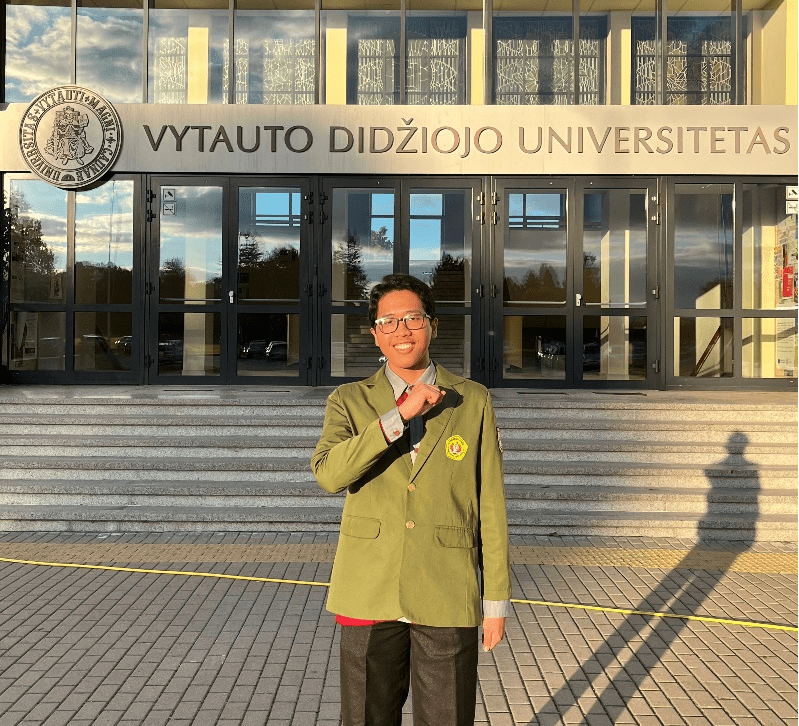
Kaunas–In my sixth week at Vytautas Magnus University, I felt a deeper connection with the academic and cultural environment around me. Adapting to the European academic style has been exciting and challenging, requiring a balance between listening, analyzing, and sharing my perspectives on complex topics with classmates from diverse backgrounds. Each course offers a unique lens through which I can better understand my discipline and the broader international perspectives surrounding me.
The week began with the Political Systems course, where we delved into Lithuania’s development and consolidation of political parties. This seminar was particularly enlightening as we examined how Lithuania’s journey to independence influenced the growth of its political institutions. The lecturer guided us through the various phases of Lithuania’s political evolution, touching on the country’s Soviet history and the eventual transformation toward democracy. It was intriguing to learn how political parties here are not just mere administrative entities but symbols of resilience and freedom for the people. The discussion brought me to reflect on the parallels between Indonesia’s journey to democracy and Lithuania, emphasizing how a nation’s political past shapes its current systems. We were encouraged to present our views, and I found myself sharing Indonesia’s path to democratization, adding to the cultural exchange within the classroom.
Next came the Leadership course, which covered the concept of Transactional Leadership. The course focused on a leadership style that prioritizes structure, discipline, and order, emphasizing the effectiveness of clear rules, rewards, and consequences in achieving organizational goals. Transactional leaders, we learned, focus more on maintaining the status quo rather than pushing boundaries, making this leadership style effective in environments that require stability and routine. The course encouraged us to consider examples of leaders in our cultures who might use this approach. I reflected on some leaders in Indonesian businesses and governments who rely on similar structured methods to maintain steady results. This session made me appreciate the diverse nature of leadership styles and how adapting them based on situational needs can be an asset for any leader.
In Competitiveness and Innovation, we delved into the concept of creativity in business. The discussion centered on different methods to foster and apply creativity in business contexts. We examined companies that have stayed ahead by constantly evolving their products and services, focusing on how creativity is a critical differentiator in highly competitive markets. The class was dynamic, with students from various cultural and professional backgrounds sharing how innovation is approached in their countries. This cross-cultural exchange broadened my understanding of the global applications of business creativity. As part of a project, I analyzed case studies, discussing what it takes for businesses to stand out in a crowded marketplace. I was inspired by how Lithuanian companies, like many Indonesian businesses, adapt to the challenges of globalization by blending local values with innovative approaches.



The Environmental Quality Assessment and Monitoring course took us into more technical territory, where we explored Groundwater Monitoring this week. This topic covered essential aspects of ensuring safe water quality, a significant issue globally but particularly relevant in Indonesia, where water resource management is a pressing concern. We studied methods used to monitor and assess groundwater quality, emphasizing real-world applications professionals employ to keep groundwater safe for public consumption. The course taught us the tools and protocols required to detect contaminants and assess ecological risks, providing us with a practical perspective on the field.
In addition to the lectures, my team and I presented a project on Surface Water Monitoring in Indonesia. We shared insights on the ecological status of surface water bodies, the main criteria for assessing this status, and the pressing challenges facing Indonesia’s water resources. The research involved analyzing the primary sources of water pollution and discussing how industrialization, urbanization, and agricultural practices impact water quality. Our presentation was well-received, and we engaged in an interactive Q&A session with our classmates and lecturer, who asked insightful questions about the environmental policies and water quality standards in Indonesia. Presenting on this topic helped me appreciate the importance of environmental monitoring in a global context and the need for international cooperation in safeguarding our natural resources.
Outside the classroom, I spent time with my fellow exchange students, learning more about their countries and cultures. My interactions with students from Europe, Asia, and beyond have enriched my experience, allowing me to see the world from multiple perspectives. We often discuss our class topics informally, comparing notes on political systems, leadership styles, and environmental issues back home. These conversations have helped solidify the academic theories we learn in class by bringing them into real-world discussions. I am grateful for the chance to build friendships across borders, which I hope will last far beyond this exchange semester.
This week, filled with academic insights and meaningful exchanges, has helped me see the importance of my studies for my career and as part of an immense responsibility to contribute positively to society. Studying at Vytautas Magnus University has allowed me to step outside my comfort zone and broaden my understanding of public administration, leadership, innovation, and environmental monitoring in ways I hadn’t expected. I look forward to the coming weeks and the new experiences and knowledge they will undoubtedly bring.
Created by: Danu Firman Cahya Sysnanda, Public Administration, Vytautas Magnus University (IISMA)
Editor: IO UPNVJT
